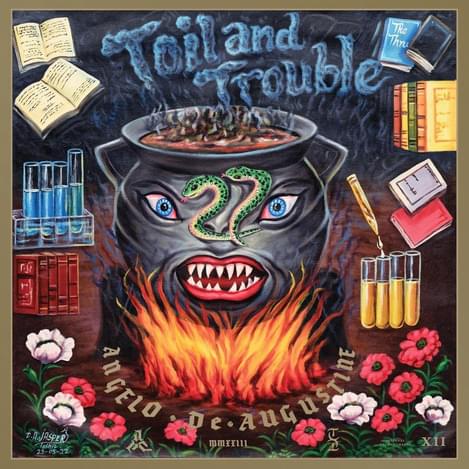Angelo De Augustine attempts to understand reality on career-defining Toil and Trouble
"Toil and Trouble"

In a state where the world’s fumed with unrestrained conflicts and violence, perhaps immersing oneself into alternate realms and fantasies isn’t such a depersonalising act.
In fact, there’s much more to it, at least according to Californian singer-songwriter Angelo De Augustine. It’s an ingenious way to perceive reality from various perspectives – a more unbiased approach to understanding the events that keep pestering peace. His fourth solo album Toil and Trouble examines these unbridled furies under the guise of “counter-world”, where he rummages through the weighty tomes that might contain a cure for the curse, sallies out into the expanse of healing waters, and visits a boundless library of memories. To achieve this feat, he crafts everything on his own, from songwriting to producing to mixing, shelving this release among the most personal and defining works of his career.
The intimate guitar fingerpicking that used to dominate De Augustine’s musical palette now receives an influx of instruments both orchestral and organic, including a glass xylophone, mellotron, and animated sound effects, like a budding flower with variegated leaves. “Healing Water” features a calming ambience of water flowing through the river, its gurglings signifying steps towards, as the title suggests, healing – a resting spot on the album before trekking farther into his melancholy. His beloved guitar is still prominent as his auteurship settles in transcendental folk, though polishing the empyrean soundscapes with these supplementary renditions enhances his vision of creating another fantastical realm.
De Augustine’s notable conscientiousness permeates all over the album; it’s a trait that’s deeply rooted in sound design and lyricism, each whisper and melody bound with purpose and meaning. When he loses the ability to articulate his burdens, he passes them on to the instruments, letting them continue conveying the message that he intends to impart like a relay. This quality is evident on the record’s centrepiece “I Don’t Want to Live, I Don’t Want to Die”, which, in a sense, harks back to certain songs on Sufjan Stevens’ Carrie & Lowell. “Oh my mother, I’ve got nothing left,” he cries before the mournful, wrenching postlude. “Send for me to greet the king / And turn myself in.” After all, he can’t escape what reality lays down before him.
As stated earlier, Toil and Trouble seeks to uncover the truth while having its feet glued to extraterrestrial grounds. Ruling by this method, one recurring thread can be discerned: the frailty of humanity, happiness hindered by bleak romance and bitter hatred. De Augustine’s heart mourns, weeps, breaks for the victims of the mass shootings on “Home Town”, its ghostlike and hefty bass thronging the crystalline guitar as if to crush it. “There’s no home / Just eternal fire,” he concludes dolefully. With itchy, rueful fingerpicks gnawing at love grown virulent, “Song of the Siren” is a beautifully-written torch song about misplaced lovers. “Over the mountain was the love I knew,” he sings specifically in the past tense. “Vocal and violent, uncontrollable like the inferno.”
Peace is where home is, he believes; but what if there isn’t eternal peace? Where, exactly, is home then? After 12 songs about death, divinity, and despair, De Augustine offers an implicit answer. “Toil and trouble, my only delights,” he sings on the final track. “I don’t know where I went wrong.” The fact that strife has become his glee evokes a sense of hopeless surrender; he understands now that reality will always involve mayhem – the best he can do is to avoid fueling it. Toil and Trouble excels in emerging from imagination with a realistic moral of the story; it accepts that peace comes from within – that even if the world’s been set aflame, one can learn to achieve tranquillity amidst the fire. Debatable, of course, but practical all the same.
Get the Best Fit take on the week in music direct to your inbox every Friday

Tunde Adebimpe
Thee Black Boltz

Julien Baker & TORRES
Send A Prayer My Way

Bon Iver
SABLE, fABLE





